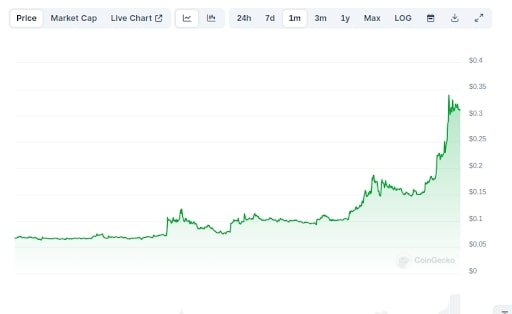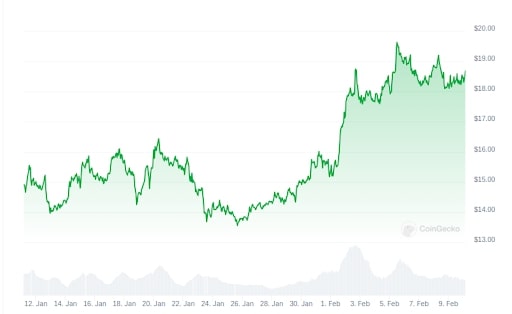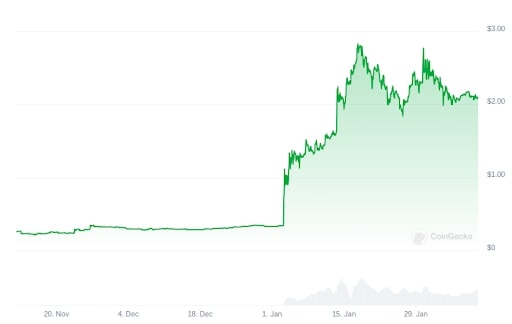Table of Contents
As we head further into 2024, the crypto market is looking ready to explode, as the prospects of a prolonged bull run grow more and more likely. Already, a number of tokens have seen their value grow sky-high in anticipation of this bullish trend, with the likes of MANTRA, Chainlink and ApeX’s native tokens all making massive gains since the turn of the year.
This trend is centered on the positive signs around Bitcoin, which is looking more and more likely to thrive in the coming months. Most notably, this outlook stems from the recent approval of several Bitcoin spot ETFs by the U.S. Securities and Exchange Commission, opening the door for millions of dollars of capital from traditional financial institutions to enter the space. Added to that, Bitcoin is rapidly approaching its next “halvening” event, which will see mining rewards reduced by 50% and create more scarcity of the world’s most famous digital asset.
The Bitcoin halvening has traditionally been followed by massive gains in the value of Bitcoin and many people are confidently predicting that the asset could reach a new, all-time high value later this year. And where Bitcoin goes, other cryptocurrencies have a tendency to follow, hence the speculation around MANTRA’s OM token, Chainlink’s LINK and ApeX’s APEX, which have all made impressive gains in recent days.
But why are these tokens looking so bullish even before Bitcoin begins its bull run?
MANTRA (OM)
Few assets have shown as much strength this year as MANTRA’s OM token, which has gained more than 350% in the last couple of weeks, rising from a low of $0.067 to $0.3101 at the time of writing.

OM is one of the biggest gainers in the entire crypto market so far in 2024, and it has also seen a notable increase in trading volume, up more than 400% since the beginning of the year, according to CoinGecko.
One reason for its impressive gains is likely to be the introduction of staking. In MANTRA’s case, staking was only introduced late last year, and already more than 17% of its total token supply has been staked by investors, showing a strong commitment by its community. Moreover, its total value locked has also risen sharply in the last few months, increasing by more than 300% from $13 million in October to over $48 million at the time of writing.
MANTRA has also benefited from the narrative around real-world assets. The blockchain is designed to support the tokenization of RWAs and is building a central limit order book that will enable tokenized trading of traditional financial products such as private equity funds, listed equity securities, fractionalized real estate assets, securities backed by sovereign governments such as U.S. treasuries.
One difference between MANTRA and other blockchains is that its core infrastructure is designed specifically to support RWAs, with focused modules that are meant to solve many of the major issues around such assets, including security, regulations, creation and management. In addition, MANTRA intends to counter the fragmented liquidity around RWAs via its incorporation of the IBC protocol, which allows it to talk to dozens of other blockchains in the Cosmos ecosystem. Finally, MANTRA is notably a permission blockchain, adhering to stringent KYC and AML requirements to ensure compliance.
There has been an awful lot of hype around RWAs and how they’re poised to transform previously illiquid markets, and given that MANTRA is one of the key players in this industry, it’s no surprise to see that investors are bullish on the prospects of OM.
Chainlink (LINK)
Chainlink’s native LINK token has gained more than 40% in the past couple of weeks, recently hitting a high of $19.75, its highest value in more than two years, and there are a few reasons behind this bullish behavior.

The world’s 13th cryptocurrency in terms of its market cap recently registered a 15% gain on a 24-hour basis, CoinGecko data shows. That rally marked a bullish breakout from a three month range that saw it hovering between $13 and $17, and suggests the continuation of a strong comeback for LINK, which was stuck at a low of just $5 as recently as June 2023.
One factor in this growth is that there has been a notable increase in the activation of formerly dormant wallets, leading to a huge spike in the “Age consumed” metric. The crypto market intelligence platform Santiment says that the sudden injection of older LINK tokens into circulation has had a major impact on its price growth.
What’s more, Lookonchain’s analysis shows that 47 fresh wallets have withdrawn more than 2.23 million LINK tokens from Binance since Feb. 5. Those tokens are worth more than $42 million at current prices, and it suggests there is a growing “hold” mentality among investors and traders, no doubt inspired by the recent price gains.
But why is this happening? Once again it comes back to the RWA narrative. Chainlink has emerged as a key infrastructure component for numerous blockchains. It connects distributed ledgers to off-chain data from the real world via a series of oracles. What’s more, its blockchain-agnostic infrastructure makes it compatible with just about every blockchain, and it can seamlessly transfer assets from one to another.
This is important because for RWAs to take off and scale, they will need access to data, compute and cross-chain transfer capabilities. And that means Chainlink, as one of the few platforms to provide all three, is poised to benefit.
Adding further fuel to the fire, analysts at K33 Research recently said LINK represents one of the safest ways to profit from the excitement around tokenized RWAs. What’s more, a recent report from Boston Consultancy Group suggests that the total value of tokenized RWAs could exceed $16 trillion by 2030.
ApeX (APEX)
Perhaps the most surprising strong-performing token this year is ApeX Protocol’s APEX token, which is up more than 524% since the start of the new year.

APEX is the native token of ApeX Pro, a noncustodial digital asset trading platform that’s focused on permissionless cross-margined perpetual contracts. The platform is primed to enable limitless access to the perpetual swap market via its order book model, combining speed and efficiency with security and transparency on every trade. It offers more than 30 different $USDC and $USDT perpetual contracts for trading with up to 50x leverage, making it a great choice for experienced traders.
The APEX token provides utility including governance, protocol incentivization and staking, and it recently hit a new all-time high of $2.84 on Jan 17, making it one of the crypto industry’s top-performing coins. The spike suggests increased demand and confidence in the ApeX Pro platform, and the team behind the project has accelerated that interest by announcing a number of upcoming changes to improve its tokenomics.
Last month, the ApeX Pro team announced an initiative that will see it work to reduce the total supply of APEX by 50%, from 1 billion to 500 million. ApeX Pro is employing a buyback and burn process to achieve this, and has already reduced the total supply to 850 million, with plans to burn more tokens during the first month of every quarter.
This increased scarcity of APEX comes alongside the launch of multiple new APEX-ETH liquidity pools in partnership with a range of DEXs. In addition, ApeX is working with Camelot on Arbitrum to support customized incentive programs and revenue-sharing with its community. That’s a bullish sign, because by expanding its presence to multiple blockchains, APEX can grow its reach, increasing demand.
ApeX’s exciting roadmap is likely another key reason behind the growing interest in its protocol. Later this year, it plans to launch a social trading framework that will enable users to copy the strategy and trades of more experienced traders, enabling them to potentially increase their profits on the platform. Finally, Apex Pro is also launching a lock-in feature for its staking program to reward its most loyal contributors. When the feature launches, APEX stakers will be able to lock their tokens into a smart contract for a designated period, improving their rewards.
With its expansion plans, token supply reduction and the organic growth in its user base, it’s no surprise that APEX is suddenly seeing a big spike in demand.
Disclaimer: This article is provided for informational purposes only. It is not offered or intended to be used as legal, tax, investment, financial, or other advice.
Investment Disclaimer















